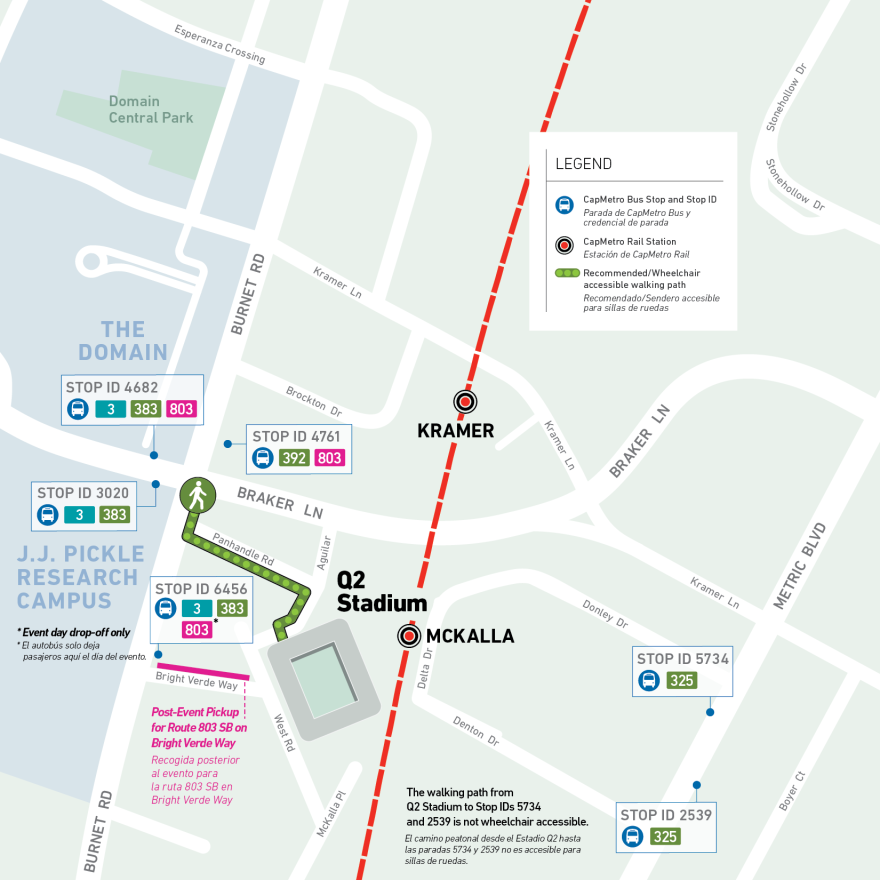Editors note: Since this story published, Capital Metro's operations chief, Andy Skabowski, said he was mistaken about when quiet zones would take effect. In an interview with KUT, Skabowski apologized for his statements and clarified the quiet zone would start in six to eight weeks.
Q2 Stadium — home of the Major League Soccer club Austin FC — is getting a new CapMetro train station this weekend. The $60 million McKalla Station, partly funded by the voter-approved Project Connect transit expansion, is designed to handle waves of soccer fans pouring out of the approximately 20,500-capacity sports facility.
"It's supporting a big venue, but it also has a lasting connectivity, even when events are not around," CapMetro vice president Dave Kubicek said this week during media tours of the facility with transit agency executives. Kubicek oversaw the design and construction of the new Red Line station.
As the CapMetro Rail (formerly MetroRail) station opens Saturday morning, people in North Austin will finally get some auditory relief from all-day train horns. Long-awaited "quiet zones" will take effect at Kramer Lane, Rutland Drive, Braker Lane and Rundberg Lane.
Those four crossings have been upgraded to meet more rigorous federal safety standards. Now, trains won't be required to blast ear-piercing warning sounds that can be heard inside buildings blocks away.

CapMetro was rushing to get McKalla Station up and running in time for Austin FC's first home match of the season on Saturday, a target set months ago after previous delays. Earlier this week, workers were still installing underground utilities and laying pavement for a 350-foot-long bus stop on Delta Drive right next to the station on the east side of Q2.
But landscaping hasn't been completed. A mural by Austin artist J Muzacz still needs to be installed. Those finishing touches are slated to be done by April or May.
Additionally, a park and ride planned for Q2 Stadium's East Lot has not been set up. Parking spaces will be available for free to people taking the train on days when no events are happening at the stadium.
"We're moving as quickly as we can on that," Kubicek vowed but couldn't offer an estimate on when the park and ride would be available to train commuters.
McKalla Station has two sets of train tracks. The second set of rails allows CapMetro to have trains ready to go in both directions after events at Q2. The first fans out of the stadium will be able to board a southbound train or northbound train immediately. CapMetro's rail yard is about a mile away, which allows for more trains to be sent quickly.

"We're probably looking at 30% to 40% increase in train capacity after a game than what he had previous," said Andy Skabowski, the CapMetro vice president overseeing operations. "It means you're going to get home a little faster."
On Q2 event days, travelers heading to Leander Station will have the option of boarding a bus that goes straight to that northern-most stop on the 32-mile Red Line. CapMetro will also run an express bus to Downtown Station, the southern-most stop.
"It gives them an opportunity to get home a little quicker and gives us a little more capacity on the train side," Skabowski said.
Bus stops for the 803, 383 and 3 routes will stay where they are.

Austin Stadco, the company behind Q2 Stadium, is kicking in $3,650,000 for McKalla Station under an agreement with CapMetro. Most of that will be paid in installments over 15 years. A big chunk of cash for McKalla, $25 million, comes from the Project Connect property tax increase approved by voters in 2020. The rest of the $60 million comes out of CapMetro's budget, which is mostly funded by a 1% sales tax.
CapMetro's agreement with Austin Stadco included the possibility of a pedestrian tunnel under the tracks or a bridge over them. That plan was abandoned. People will have to walk directly over the train tracks. Safety gates block the pedestrian crossing when a train is coming.
The transit agency also gets exclusive use of Q2 Stadium for one day per year without having to pay venue rental fees. CapMetro executives at the media tour this week weren't aware of any such events planned at Q2 for 2024.
McKalla Station was supposed to replace Kramer Station, which is less than half a mile away. But CapMetro hasn't set a date to close Kramer, because of delays in completing another Red Line stop near the Domain.
Broadmoor Station — which is slated to have two double-length, covered platforms — had been scheduled to open this year. But construction hasn't even started on the station at a 66-acre mixed-use development called Uptown ATX.

CapMetro has offered some explanations for the Broadmoor delay, blaming mostly "COVID-related market impacts" on the Uptown ATX development and challenges getting city permits.
"We do not have a timeline to share today," said Sharmila Mukherjee, a CapMetro vice president in charge of planning. "We are progressing well in the discussion, but for a while there was no discussion because we were essentially waiting to get all of the arrangements and agreements sorted out."
Broadmoor Station is a public-private partnership, so the estimated $24 million price tag was planned to be split evenly between CapMetro and Uptown ATX developer Brandywine Realty Trust.
A year-old filing with the state, first reported by the Austin-American Statesman, suggested Broadmoor Station could be completed by June 2025. The cost of the Red Line station, according to the filing, had grown by almost 50% to more than $35 million.
At McKalla Station, an opening ceremony is set for 10 a.m. Saturday. The event will include Austin Mayor Kirk Watson, Congressman Greg Casar (D-Austin), Austin FC President Andy Loughnane, CapMetro CEO Dottie Watkins and other high-ranking transit officials. CapMetro Rail will be free all day in celebration.
Correction: A previous version of this story incorrectly said that Congressman Lloyd Doggett would be at the opening ceremony for McKalla Station.





